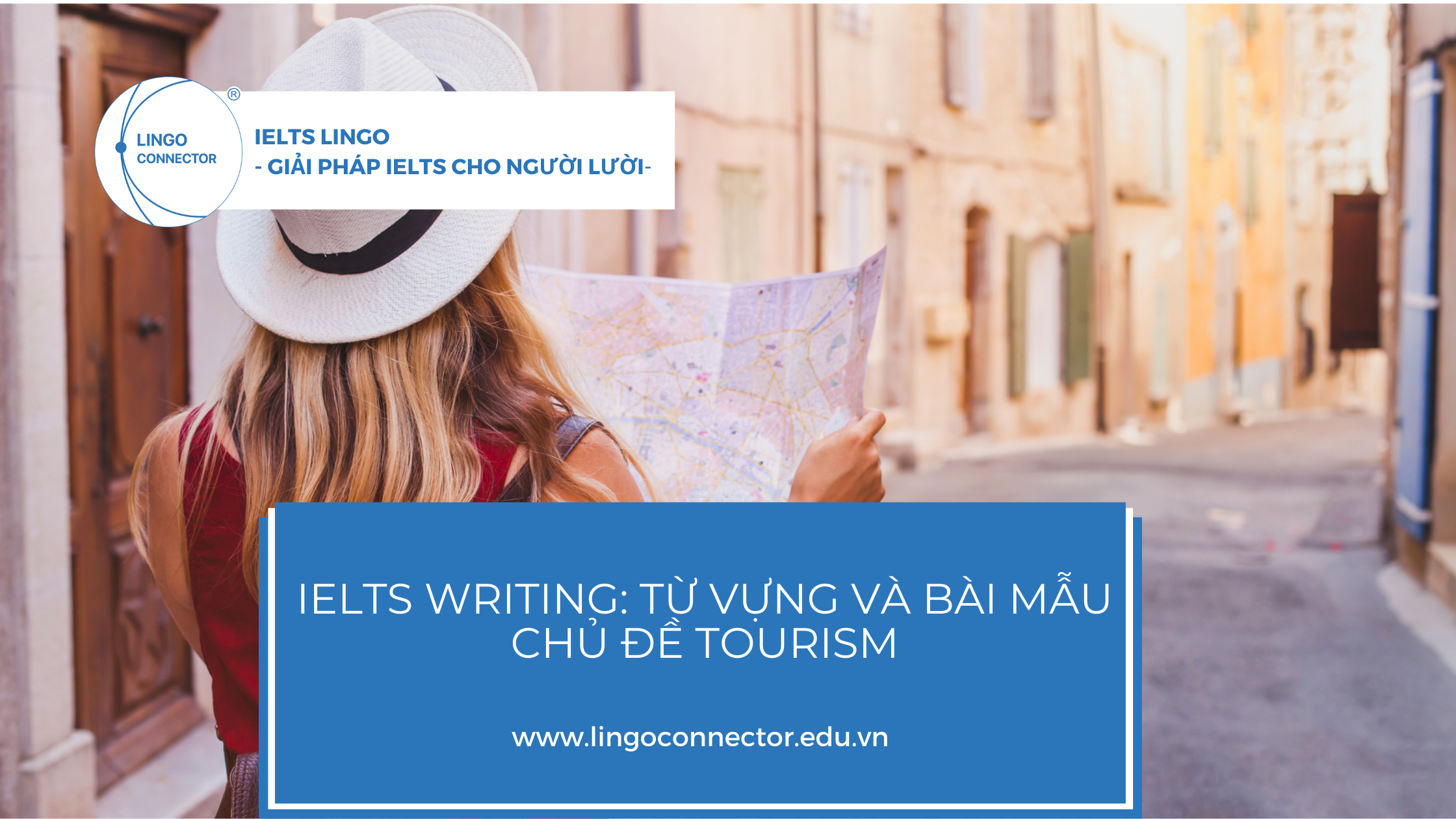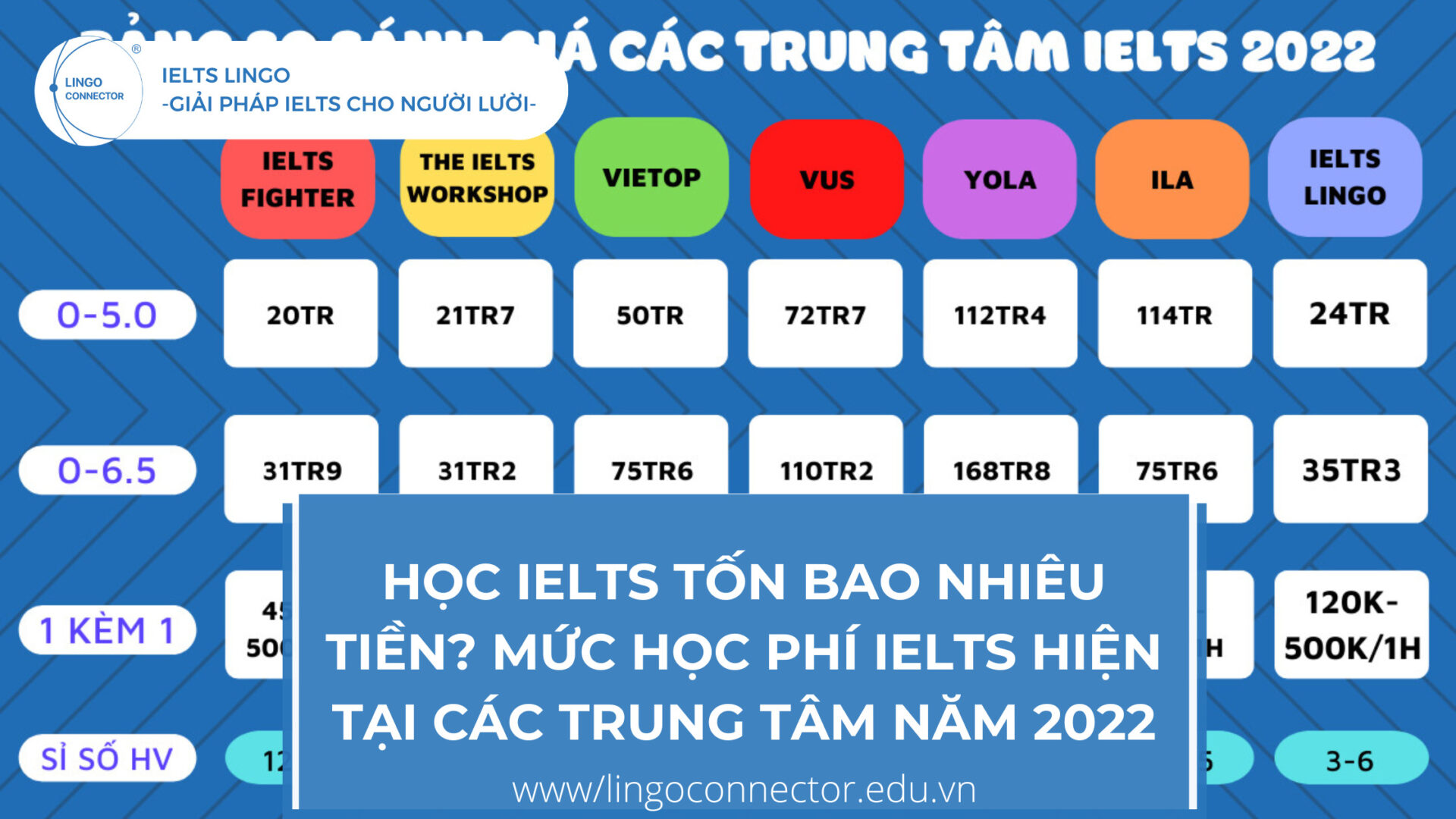Tourism là một trong những chủ đề khá quen thuộc và cũng có rất nhiều thí sinh yêu thích chủ đề này, và để có thể kể những câu chuyện hay hay những suy nghĩ của bạn thân về chủ đề này thì chúng ta cần có những từ vựng hay và những lập luận thuyết phục. Vì thế, hôm nay IELTS LINGO CONNECTOR sẽ chia sẻ đến các bạn những từ vựng và bài mẫu hay để các bạn có thể tham khảo, cùng Lingo theo dõi bài viết dưới đây nhé!
Xem thêm:
Từ vựng và bài mẫu IELTS SPEAKING chủ đề Memories
IELTS WRITING: TỪ VỰNG VÀ BÀI MẪU CHỦ ĐỀ WORKING

1. Từ vựng IELTS chủ đề Tourism
- Hospitality (n): sự hiếu khách
- Indigenous people = the locals: người dân địa phương
- Heritage site: khu di sản
- Nightlife: cuộc sống về đêm
- Unexpected expenses: chi phí phát sinh
- Cost-effective (a): (mang tính) chi tiêu hiệu quả
- Tranquility: sự yên tĩnh
- Hustle and bustle: cuộc sống tấp nập
- Worth-living (a): đáng sống
- Rat race: cuộc sống xô bồ
- Culture shock: sốc văn hóa
- Stunning/ scenic/ breathtaking/ picturesque/ superb (a): (cảnh) đẹp tuyệt vời, ngộp thở, như tranh vẽ, tuyệt hảo
- Go sightseeing: đi ngắm cảnh
- Out of season >< peak time: mùa cao điểm
- Flock to (v): lũ lượt kéo nhau đến
- Tourist trap: địa điểm du lịch quá đông đúc và bóc lột khách du lịch
- Cuisine: nền ẩm thực
- Local specialty: đặc sản địa phương
- Green tourism = sustainable tourism = eco-tourism: du lịch sinh thái
- National park: vườn quốc gia
- Wildlife preserve: là vùng đất giúp bảo tồn các môi trường sống tự nhiên, nhằm phục vụ cho công tác bảo tồn, giáo dục và nghiên cứu
- Carbon footprint: dấu chân carbon
- Broaden one’s horizon: mở rộng chân trời
- Establish a relationship: thiết lập một mối quan hệ
- Native resident: người dân bản địa
- Interchange: trao đổi
- Take its toll on something/somebody: gây hại cho ai, cho cái gì
- Mass tourism: du lịch đại chúng / đại trà
- Popular tourist destinations = famous tourist attractions: những điểm đến du lịch phổ biến
- Cultural activities: những hoạt động văn hóa
- Customs: phong tục
- Environmental deterioration
- Remote areas
- Ethnic people: Người dân tộc thiểu số
- Integrate (v) into: hòa nhập với
- Cultural assimilation (n): sự đồng hóa về mặt văn hóa
- Holidaymaker: khách du lịch
- On an unprecedented scale: ở một quy mô chưa từng thấy
- revenue: nguồn thu, nguồn lợi
- sustainability: sự bền vững
- inclined towards: nghiên về
- mass tourism: du lịch đại trà
- international commerce: thương mại quốc tế
- surpass: vượt qua
- garment: ngành dệt may
- inferior to: trở nên thua kém
- instrumental in: rất quan trọng trong việc tạo nên
- endowed with: được ban tặng, được trời cho
- paradigm: mô hình
- personal solace: sự khuây khỏa cá nhân
- thought-provoking: khiến cho người ta suy nghĩ nhiều
- impoverished: nghèo khó, khó khăn
- prevail: áp đảo, chiếm ưu thế
- influxes (of): những dòng người lũ lượt
- flock: kéo đến với số lượng lớn
- plague: gây vấn đề, gây rắc rối
- irreversible damage: hư hại không thể phục hồi
- a force for good: một ảnh hưởng tích cực
- judiciously: một cách khôn ngoan
- catastrophe: thảm họa
- tamper with: phá hoại, làm hư hại
2. Paraphrasing chủ đề Tourism trong IELTS Writing
- to travel abroad = to travel to a foreign country = to travel to other countries: du lịch nước ngoài
- space tourism = space travel = travelling to other planets = travelling to the universe: du lịch vào không gian
- popular tourist destinations = famous tourist attractions: điểm đến du lịch nổi tiếng
- international tourism = international travel: du lịch quốc tế
- tourists from overseas = international tourists = foreign tourists: khách du lịch quốc tế
- to travel alone = to travel on your own: đi du lịch một mình
- local residents = local people: người dân địa phương
- remote areas = isolated places = distant regions: những khu vực xa xôi, hẻo lánh
- historical sites = historic landmarks = historic buildings: các địa danh lịch sử
- stunning scenery = spectacular natural landscapes: cảnh thiên nhiên tuyệt đẹp
- … bring a range of benefits for X = X benefit(s) a great deal from …: mang lại lợi ích cho X/ X hưởng lợi nhiều từ…
- to give X a chance to explore the world = X is/are given the opportunity to explore different cultures and traditions = X have a chance to explore different parts of the world: cho X cơ hội khám phá thế giới/ X được trao cơ hội khám phá các nền văn hóa và truyền thống khác nhau/ X có cơ hội khám phá các khu vực khác nhau trên thế giới
- to open our minds = to broaden our horizons: mở rộng tầm nhìn
- to meet new people = to make friends with other travellers: làm quen với nhiều người
- to gain a deeper insight into other cultures … = to have a deeper understanding of other cultures: có cái nhìn sâu sắc hơn về các nền văn hóa khác
- the growth in the tourist industry = the development of tourism: sự phát triển của ngành du lịch
- to be very important to any country’s economic growth = to play an essential role in any nation’s economic development = to help boost economic growth: quan trọng cho sự phát triển kinh tế của bất kỳ quốc gia nào
- low-cost airline = cheap air travel = budget airline: hãng hàng không giá rẻ/ đi du lịch giá rẻ
- tourist facilities = restaurants, theme parks, water parks,…: cơ sở vật chất du lịch/ khách sạn, công viên giải trí, công viên nước
- to have a negative effect on the environment = to have an adverse impact on the environment = to cause environmental damage = to lead to air pollution/ water contamination/…: có ảnh hưởng tiêu cực lên môi trường/ gây sự tàn phá môi trường/ dẫn tới ô nhiễm không khí, nước
- to threaten wildlife = to pose a threat to wildlife: đe dọa động vật hoang dã
3. Bài mẫu IELTS Writing chủ đề Tourism
Many developing countries are currently expanding their tourist industries. Why is this the case? Is it a positive or negative development?
Tourism in recent years has been booming on an unprecedented scale, with many developing countries considering it as a major income source. The main reason for this is the great revenue it generates, and I believe that it is a positive development in some countries that embrace sustainability, but a negative one in some others who are inclined towards mass tourism.
The major reason for the rapid growth of tourism is the great profits it might bring. Indeed, tourism has become one of the major players in international commerce, with many statistics indicating that the revenue it brings equals or even surpasses that of many industrial fields such as garment, food production or oil exports. In cases of developing countries where technology in industrial areas is somewhat inferior to developed ones, tourism is deemed instrumental in promoting economic well-being. Any country endowed with natural beauties and historic sites can take advantage of those precious sources to boost their economy.
Sustainable tourism, with all economic, social and environmental angles being thoroughly taken into consideration, is a welcome development. It helps generate great profits, it is a good and healthy form of entertainment for tourists, and it also provides jobs for inhabitants living in tourist destinations. Reality Tours and Travel in India is a great example of such a tourism paradigm. Travellers taking the tour are provided with not only personal solace but also valuable, thought-provoking experiences about the locals’ lives, and the profits of the tours eventually go to the development of the impoverished areas in Mumbai and Delhi. However, in some other developing countries where mass tourism prevails, this has become a disaster. Influxes of tourists flocking to one area in peak seasons, littering all over the place, intervening in the locals’ traditional values and damaging the environment have plagued the overall well-being of those countries. The Great Pyramid of Giza in Egypt, for example, has been reported to suffer from irreversible damage as a result of the enormous number of visitors coming there to see the site every year.
In conclusion, tourism has enjoyed increasing popularity in developing countries because it is a profitable economic sector. It can be a force for good if developed judiciously and sustainably, yet a catastrophe if it is out of control and tampers with the life and nature of the local areas.
Hy vọng bài viết trên sẽ giúp cho các bạn những kiến thức hay về chủ đề Tourism trong IELTS Writing nhé. Và đừng quên ghé thăm thư viện của Lingo để cập nhật những bài viết hay và bổ ích nhé!
Nguồn: IELTS Vietop























